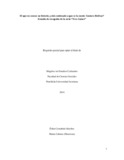El que no conoce su historia ¿está condenado a que se la cuente Gustavo Bolívar? estudio de recepción de la serie -Tres Caínes-

Fecha
2014Autor(es)
Castañeda Sánchez, ÉrikaDirector(es)
Cabrera, MartaPublicador
Pontificia Universidad Javeriana
Facultad
Facultad de Ciencias Sociales
Programa
Maestría en Estudios Culturales
Título obtenido
Magíster en Estudios Culturales
Tipo
Tesis/Trabajo de grado - Monografía - Maestría
COAR
Tesis de maestríaCompartir este registro
Citación
Documentos PDF
Resumen
En 2013 RCN estrenó Tres Caínes , dramatizado centrado en la vida de los hermanos Castaño, fundadores de las Autodefensas Unidas de Colombia (AUC). Esta serie produjo un intenso debate sobre el papel los medios en la construcción de la memoria, en el que se cuestionó la manera en que se investigan y cuentan los hechos del conflicto. A pesar de la importancia de dichas críticas para comprender la incidencia de estos dramatizados en la construcción de la memoria, la discusión debe desplazarse hacia las audiencias, e indagar cómo éstas los consumen. Por lo cual, la investigación que aquí se presenta busca establecer la manera en que familias bogotanas de diferentes estratos sociales, decodificaron la serie Tres Caínes . El encuadre conceptual empleado en la investigación parte del modelo de análisis de Stuart Hall, conocido como el circuito de la cultura, el cual requiere un acercamiento al objeto de estudio que aborde sus etapas de producción, circulación y consumo. Teniendo en cuenta esto, aquí se realiza una reconstrucción de las tres etapas haciendo énfasis en la recepción de la serie, tomando como puntos de referencia algunas investigaciones de David Morley, sobre el consumo de televisión y el trabajo de Jesús Martín-Barbero centrado en las telenovelas.
Abstract
"In 2013 RCN released ""Tres Caines"" this serie is based on the Castaño brothers s lives, founders of the United Self Defense Forces of Colombia (AUC). This serie produced an intense controversy on the role of media in the construction of memory, the way how the facts of the conflict were investigated and were showed to the public was questioned. Despite of the importance of such critics to understand the impact of this serie in the construction of memory, the discussion should move to the audiences, and investigate how they consume this. Therefore, the research presented here seeks to establish how Bogota families from different social stratus consumed the ""Tres Caines"" serie. The conceptual framework used in the research,part of the analysis model of Stuart Hall, known as the circuit of culture, which requires the approaching to the study s object that tackles the stages of production, circulation and consumption. With this in mind, here is a reconstruction of the three with emphasis in the reception of the serie, taking as benchmarks David Morley's researchs about the TV consumption and the Jesus Martin-Barbero s work focused on the Telenovelas."
Temas
Telenovelas - Aspectos sociales - ColombiaMaestría en estudios culturales - Tesis y disertaciones académicas
Estadísticas Google Analytics

